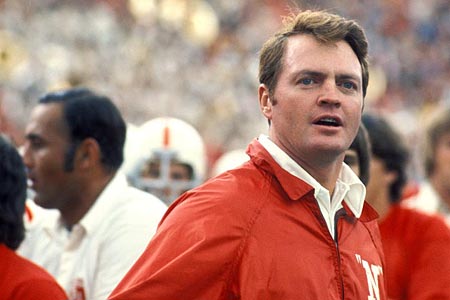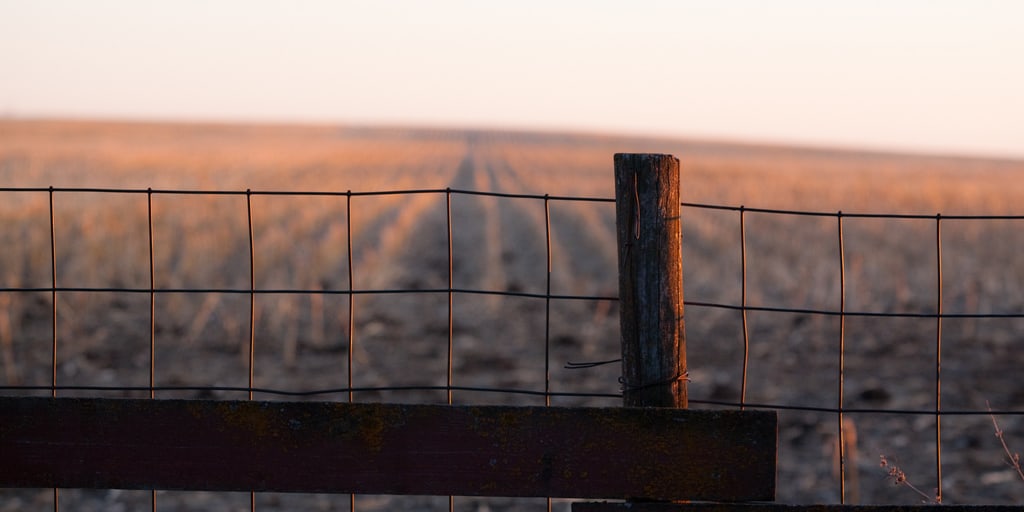Just looking at Tom Osborne could be enough to make you cry.
No, not just on the night in question: that night thirty years ago he raised two fingers in the air, and Turner Gill lined up over center, and rolled right, and sighted Jeff Smith, and let the ball go into the warm Miami air…
No, it was all those Saturday afternoons of my childhood, throughout the ‘70s and ‘80s. All those days that the sight of him coaching from the Nebraska sidelines could make you, if not cry, at least tear up a little.
Maybe it was the string of dismal 9-2 seasons that hung around his neck like a rosary of hot coals on some 17th-century martyr.
Or maybe it was because of how he attired himself for his Saturday duties. Other legendary coaches of the era wore sport coats and ties. Tom Osborne jogged onto the field in white knit golf shirts and bright red belt-less coaching pants. They sported iconic fedoras and cursed. Tom Osborne wore clunky earphones and chewed gum.
But maybe the real reason Tom Osborne could envelope you in a wave of mysterious sadness, could break your heart every moment of your life, was because he just seemed so nice, and good, and true. Yet at the same time you never quite knew what he was thinking or feeling. Whether Nebraska won or lost its football games, he was always so even, so composed. All the fair-skinned, red-haired, plain-spoken, tall and slender life of him was drawn together in stolidity and rationality and Methodism. He was a blank slate upon which we fans read what we needed to read, felt what we needed to feel.
What many of us felt (or maybe only I felt) was a desire to comfort, comfort our coach in all his niceness and goodness and lack of emotion that few beyond the borders of Nebraska would ever fully understand. For how many other states would glorify reserve so nakedly by putting the following quote on sports memorabilia: “I celebrate a victory when I start walking off the field.” says Osborne, as imprinted on a Husker poster. “By the time I get to the locker room, I’m done.”
***
Stairs at Memorial Stadium
9-2 seasons? Dismal? Considering that Osborne helmed our football team in the wake of back-to-back national championships in the early ‘70s delivered by the hefty, garrulous Bob Devaney, those results were, to Cornhusker fans, dismal. And yet he was so even-keeled. So patient. Oh Tom Osborne! So patient in the face of all those losses at the end of every season to whiny, tan, thin-lipped men such as Barry Switzer of Oklahoma; in the face of the fed-up fans – not everyone wanted to comfort him – writing into the local paper’s “Voices from the Grandstand” calling for his firing.
He couldn’t win the big one, they wrote. His game plan was too reliant on giant farm boys from Wisner and Gothenburg who could smash patsies like Iowa State or Minnesota but would be left flummoxed and gasping come the fancy aeronautics of some coastal team, or Switzer and his cocky wishbone. Nebraska would lose again and Tom Osborne would just go on chewing his gum and drive home in some archetypal Buick Skylark and quietly go to church the next day and later maybe drink some pop.
Oh Tom Osborne. Emotionless? Distant? Or just so achingly Nebraskan. Not a big deal. Tomorrow’s another day. Don’t take anything personally. Rise above everything. Dacron is sensible and work-ready. Dadgummit is an effective enough curse.
Indeed Tom Osborne seemed to filter into his bones everything in the state that was plain and sturdy and honest and upright and sad and gloomy and haunted with the bleak timbre of autumn afternoons and collapsing farmhouses and trick plays with painfully cute Eastern European nicknames – the Fumblerooski, the Bouncerooski – and the way fans in the north end zone of War Memorial Stadium, with unvarying propriety, clap for the opposing players as they leave the field, even if they have beaten us. (Not to mention the way other Nebraskans talk about the way fans in the north end zone applaud the opposing players even if they have beaten us.) The coach bears within him the soft mild lines of Lincoln, the richness of green bean casserole, the thickness of a porterhouse steak, the road signs that read “Welcome to the Good Life,” and all that garish scarlet Husker red, hardly a subtle flavor on the state palette, this is me, what you see is what you get, we don’t make a fuss around here, who am I to be a bother? And in the end Nebraska will probably lose, even if we win (and indeed we have won it all, twice) we will probably in some cosmic way Lose. We will lose because Carter boycotted the damn Olympics, there’s a grain embargo on Russia, the calves are freezing, auctioneers are circling, John Cougar is strumming on the front porch and Nebraska is just a gray road people drive down to get somewhere else. Nonetheless duty is duty and virtue is good and sex before marriage is not and we just try to do the right thing and the right thing to do usually – no, always – is the hard thing to do but you will do it anyway and the wind blows bitter across the plains.
Somehow all of this swam in, around and through Tom Osborne standing on the sidelines all those years.
It certainly was in him during the night in question.
***
The night in question. January 2, 1984. The night Nebraska played Miami in the Orange Bowl for the national championship and Tom Osborne decided to go for two.
In the ‘83 season top-ranked Nebraska had been a powerhouse, a wrecking ball, running the table, a feast of cliches. The superb Gill at quarterback, Heisman- winner Mike Rozier at running back, All-American Irving Fryar at wingback and a beast of an offensive line to lead them. They crushed everyone in sight. They were declared by some to be the best college team ever. They were expected to roll over Miami.
I was 11, a boy in suburban Omaha and a rabid Cornhusker fan, like every kid in that state with blood in his body. Nebraska was going to win its first title in my young life. Osborne maybe would show some emotion. All was going to be right in the world.
But then the game was actually played, and out of the east arose a quarterback named Bernie Kosar.
Bernie Kosar and his orange and green compatriots rose up and threw the ball and caught the ball and flummoxed the defense and by the fourth quarter were up 31-17. Miami was up and the game was winding down and just like that it appeared to be all over.
I sat on the orange carpet of our family room and watched this bleakness unfold on our Zenith. As it became clear we were going to lose, I started going through a checklist of meaningful things in my life – things that would still be true even when Nebraska lost. I am a good person. I am a Christian. Being a Christian means something for my eternal soul. I have friends. I have a dog. I play soccer. I like playing soccer and I think I am good at it.
I went off to practice a reading for a school mass the next day. There was no use in staying and watching the rest of this misery. It was done. Later I strolled back into the family room before going to bed, just to pass by the last burial rites of the greatest team ever.
And lo and behold.
Nebraska had come back. They fought back to make it 31-24, regained possession of the ball and were marching down the field for one final drive. With a minute to go the Huskers found themselves at 4th and 8 on the Miami 22 yard-line (or thereabouts – I have no desire to consult official records or films and relive this any more than is necessary.) Gill, the Platonic Form of the option quarterback, took the snap and ran to the right. Just before he was hit he pitched the ball to Jeff Smith, playing for the injured Rozier. Smith took the pitch and barreled down the sideline for the first down. But then he kept going, all the way downfield where he was tackled into the orange cone at the end zone line. He had scored and suddenly we were down by one. My family room and the entire state went crazy.
Immediately Tom Osborne in all his stoic even-keeled red slacks big earphones fair-skinned just another guy not a big deal way puts his two fingers in the air.
He wants the two-point conversion. He would gamble and go for the win. He would not kick the point-after for a tie, which would have all but guaranteed the 12-0 Huskers a national championship over the one-loss Hurricanes. Failing on the two-point try, however, would give the game and the title to Miami.
***
An article this summer on the website Grantland discussed the debate in the sports world thirty years ago following Osborne’s decision. Ought he really have gone for the win? Was it in fact a selfish thing for the coach to go for two and gamble with his players’ chance at the national championship? I still recall a headline all those years ago in the Omaha paper the day after the game. It said something like, “Ara: I would have gone for tie.” Ara Parseghan, the former coach of Notre Dame, played for the tie in the 1966 national championship against Michigan State. After a 10-10 draw, his team, indeed, was rewarded with the national title.
While surely there were some in our state who debated this question as well, I can’t fathom that there were legions of Nebraskans wishing Tom Osborne had gone for a tie. I was not even sure it was a question one was allowed to ask. What if he’d kicked it? Weren’t we forbidden, in the manner of Catholics and a female priesthood, even to discuss such possibilities?
But maybe it is high time someone stand up to the unyielding magisterium of Good Life common wisdom and declare that Osborne ought to have gone for the tie and the championship. Maybe, we can speculate, he should have restrained his team from doing what football players do – namely giving everything they have to the last fraction of the last second of the last play to score more points than the other team. He should have reined in the crushing offense and brought out the 164 lb. soccer player. He ought to have done what is expedient and utilitarian. He should have been aware that it is okay to aim for a glory bestowed by others, sportswriters in a year-end poll, rather than won or lost on the field itself. Let a democratic vote name you the victor, Coach, rather than having to go out and prove it yourself by actually winning the game.
Yes, we can speculate on all of that. Maybe Tom Osborne should have been a different kind of man and done a different thing. Maybe Tom Osborne should not have been Tom Osborne.
(It is worth noting that troubling questions came up ten years later on precisely that point, whether Osborne should have done a different thing—but this time in how he dealt with his student-athletes. Namely, should he have been more strict in how he disciplined players accused of violent, off-the-field criminal behavior. In an email interview, Osborne told me he made his decisions based on the facts at hand and “would not have done differently.”)
So this too is part of the Osborne story. As is the night of January 2, 1984.
***
Nebraska lines up at the Miami three. Turner Gill takes the snap. The offensive line goes left and the Miami defense follows. Gill rolls right and tosses the ball to Jeff Smith. A Miami defender realizes the misdirection that Nebraska has run. He turns around and dives. He just gets his fingers on the ball and tips it away off Smith’s shoulder pads into the end zone. And that is that.
Osborne would go on a decade later to win three NCAA championships in a span of four years. But no amount of grace misted down from future crystal footballs would ever fully bind up that chip in the bone, that tear in the kidney, that rent deep in the chromosomes of our state’s athletic history. We would always have the failed conversion.
Yet we also will always have Osborne at the end of the game taking off his headphones and jogging onto the field to do the right thing – to shake people’s hands and show no emotion and be somehow larger than the sum of everything that has just happened.
In my family room and everywhere we groaned and sighed and then went off to sleep in our coffins for yet another night. In our heads we composed more letters to “Voices in the Grandstand” or simply offered up prayers for the sorrows of our team and the conversion of Russia and gratitude for our health, at least for one more day. Because while you can be right and good you can’t guarantee the right and good will happen to you, and the wind blows steady down the plains.



